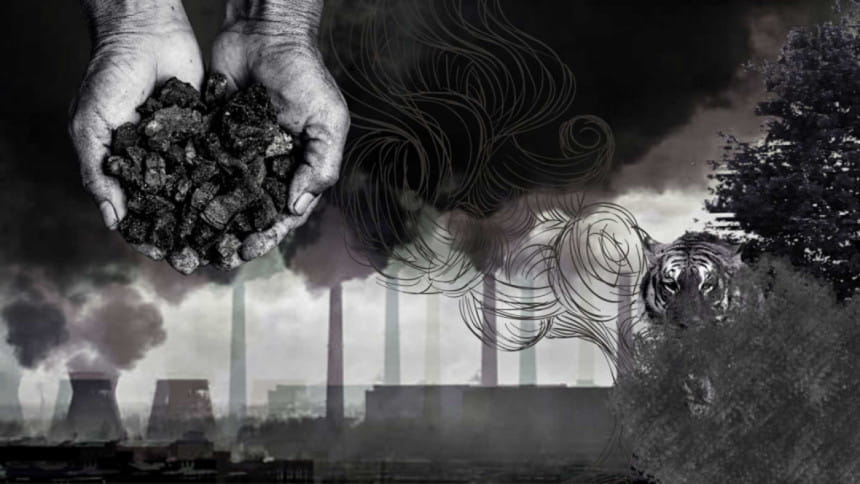Chattogram could become a carbon catastrophe on a global scale: Study

Chattogram division is at high risk of being one of the world's largest carbon catastrophes once all the fossil fuel power plants – planned to be constructed in the division – come into operation, according to a joint study.
The report predicts the massive construction projects will have disastrous consequences for the local ecology and waterways, communities and livelihoods, health, as well as the climate in Chattogram.
The report titled, "A Carbon Catastrophe in the Making: The Dirty Energy Plans in Chattogram", conducted by Market Forces, Bangladesh Poribesh Andolon (Bapa), and Waterkeepers Bangladesh, was published in a press conference today. It highlighted the adverse impacts of the proposed 20 gigawatts (GW) coal and gas power plants in Chattogram.
An additional 1.38 billion tonnes of carbon dioxide equivalent (CO2-e) will be emitted into the atmosphere throughout the plants' operational lifetime, said the study.
According to the report, the government is moving ahead with almost two-thirds of its fossil fuel projects proposed in Bangladesh, which are set to be constructed in Chattogram division. This massive expansion of fossil fuel plants would be predominantly built or financed by foreign companies from Japan and the United States.
"Companies from Japan and the United States should stop treating Bangladesh as one of the last dumping grounds for polluting power technology and instead help it meet its new power needs with clean, affordable, and climate-friendly technologies," said Julien Vincent, executive director at Market Forces, an environmental finance NGO focused on fossil fuel projects in Asia and Australia.
Arguably, the report states, the most damaging proposal is Matarbari coal power plants. If built, the health effects from air pollution from the Matarbari 1 and 2 projects would result in an estimated 6,700 premature deaths throughout their operational years.
This project also contradicts Japan's 2021 G7 commitment to halt overseas coal financing.
"Companies such as Mitsubishi, JERA, and General Electric (GE) are pushing for these projects so that they can profit from the expansion of toxic power plants, with little regard for the cost to Bangladesh and Bangladeshis," said Sharif Jamil, general secretary, Bangladesh Poribesh Andolon (BAPA).
"Investors in these companies need to be aware: Bangladeshis want investment in clean, cost-effective energy, not polluting, expensive LNG," he said.
"Sumitomo Corporation, a Japanese conglomerate, withdrew from the Matarbari 2 coal plant. Japanese private banks and investors are strengthening their climate policies dramatically. Coal and gas projects will not be financeable soon, even if by Japanese investors," said Yuki Tanabe, program director, Japan Center for a Sustainable Environment and Society (JACSES).
The speaker said that Bangladesh already has a significant overcapacity problem. Around 60 percent of installed capacity was not used in 2020-2021.
The gap between power production capacity and actual demand has gradually increased over the previous few years, states the report citing Institute for Energy Economics and Financial Analysis (IEEFA).
Bangladesh's government paid USD 1.6 billion to companies for underutilised power capacity in 2021. On the other hand, the Bangladesh Power Development Board (BPDB) is calling for pricing hikes to offset the crippling expenses of buying power from independent power producers, shifting the financial burden of Bangladesh's overcapacity crisis to electricity users, the report states.
According to IEEFA, Bangladesh's economy would be exposed to a volatile price market from imported fuel and people would be forced to face financial risks that should have been borne by foreign private enterprises.
"Climate science and energy economists have made it clear: if we are serious about averting the climate catastrophe, we need to stop building new coal, gas, and oil projects," it said.
Dr Khondaker Golam Moazzem, research director, Centre for Policy Dialogue (CPD); Sharmeen Murshid, chief executive, Brotee; Munira Chowdhury, research coordinator, Market Forces, among others, also addressed the webinar.

 For all latest news, follow The Daily Star's Google News channel.
For all latest news, follow The Daily Star's Google News channel. 








Comments